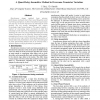105 search results - page 10 / 21 » Distributed Checkpointing Using Synchronized Clocks |
104
click to vote
IPPS
2009
IEEE
15 years 8 months ago
2009
IEEE
Failure detectors are a service that provides (approximate) information about process crashes in a distributed system. The well-known “eventually perfect” failure detector, 3P...
165
click to vote
MOBISYS
2011
ACM
14 years 5 months ago
2011
ACM
Clock synchronization is critical for Wireless Sensor Networks (WSNs) due to the need of inter-node coordination and collaborative information processing. Although many message pa...
103
click to vote
VLSID
2005
IEEE
16 years 2 months ago
2005
IEEE
Synchronous design methods have intrinsic performance overheads due to their use of the global clock and timing assumptions. In future manufacturing processes not only may it beco...
119
click to vote
SOSP
2005
ACM
15 years 11 months ago
2005
ACM
Speculator provides Linux kernel support for speculative execution. It allows multiple processes to share speculative state by tracking causal dependencies propagated through inte...
135
click to vote
ISPD
2004
ACM
15 years 7 months ago
2004
ACM
Modern processors and SoCs require the adoption of poweroriented design styles, due to the implications that power consumption may have on reliability, cost and manufacturability ...

